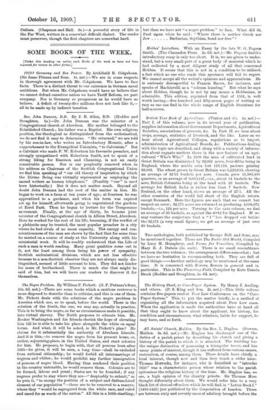Rev. John. Duncan, D.D. By J. B. Allan, B.D. (Hodder
and Stoughton. 5s.)—Dr. John Duncan was the minister of a Congregational church at Aberdeen. His mother belonged to the Established Church ; his father was a Baptist. His own religious position, the theological as distinguished from the ecclesiastical, we do not find it easy to determine. " He returned," we are told by his son-in-law, who writes an Introductory Memoir, after a rapprochement to the Evangelical Unionists, "to Calvinism." But a Calvinist who made F. W. Robertson his favourite preacher, and strongly sympathised with Robertson Smith, not to speak of a strong liking for Emerson and Channing, is not an easily conceivable person. Nor is our perplexity removed when in his address as Chairman of the Scottish Congregational Union we find him speaking of " our old theory of inspiration by which the Divine Being was virtually represented as employing- the sacred writers as human telephones." (Possibly "our" is used here historically.) But it does not matter much. Beyond all doubt John Duncan had the root of the matter in him. He began to work on a farm at ten years of age ; at fourteen he was apprenticed to a gardener, and when his term was expired set up for himself, afterwards going to superintend the gardens at Errol Park. Then he began to lecture for the Temperance movement. Finally, at the age of thirty, he became joint minister of the Congregational church in Albion Street, Aberdeen. Here he worked for the rest of his life, becoming, if the verdict of a. plebiscite may be trusted, the most popular preacher in a city where he had rivals of no mean capacity. The energy and con- scientiousness of the man are shown by the fact that for some time he carried on a course of study at the University along with his ministerial work. It will be readily understood that the Life of such a man is worth reading. Many great qualities come out in it, not the least among them being his power of sympathy. Scottish ecclesiastical divisions, which are not less effective because to a non-Scottish observer they are not always easily dis- tinguished, seemed of little account to him. They did not hinder his sense of brotherhood. There is much else that might be said of him, but we will leave our readers to discover it for themselves.














































 Previous page
Previous page